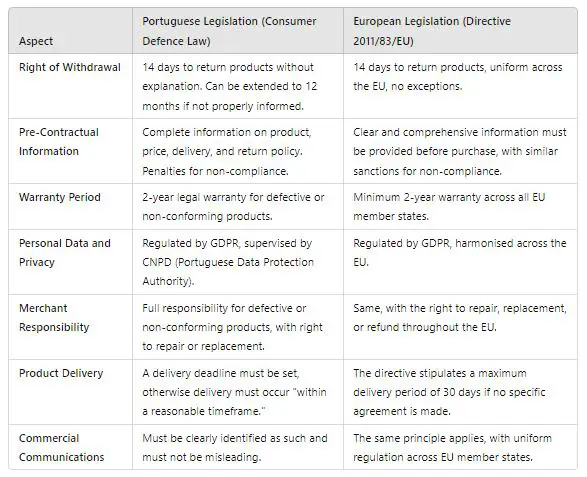Introduction
E-commerce is growing rapidly and has become a fundamental part of modern economies. In Portugal, consumer protection laws in e-commerce play a crucial role in guaranteeing a safe and transparent online shopping experience. These laws follow European Union guidelines, but there are national particularities that make the Portuguese context have some important differences. In this article, we will explore in detail the rules and regulations for consumer protection in e-commerce in Portugal, comparing them with the rules in force in the rest of Europe.
1. Consumer Protection in Portugal in the Context of E-commerce
Portugal has a series of laws aimed at protecting consumers in the digital environment. These regulations ensure that consumers have the same rights as they would when making physical purchases, and are reinforced by European Union directives, harmonising protection throughout the European area.
1.1 Consumer Defence Law in Portugal
The Consumer Protection Law (Law no. 24/96, of 31 July) in Portugal is the main legal instrument for protecting consumer rights, covering both online and physical purchases. Below are the main aspects that guarantee safe online shopping:
Right to Transparent Information:
The consumer must be clearly and accurately informed before finalising the purchase. This includes
- Detailed description of the product or service.
- Final price, including taxes, delivery fees or other additional charges.
- Expected delivery time.
- Returns policy, including the conditions and deadlines for returning the product.
Failure to comply with this obligation may result in sanctions for the trader, such as fines and the obligation to reimburse the consumer.
Product quality and conformity:
The products sold must be in accordance with what was advertised, and must be suitable for their intended purpose.
If the product is defective or does not conform to the description, the consumer has the right to:
- Repair of the product.
- Replacement with a new product.
- A full or partial refund.
The two-year legal guarantee is a right that covers the consumer for any lack of conformity that the product presents.
Right of withdrawal:

- The consumer has 14 days to return the product purchased online, without having to justify the reason for the return.
- The refund must include all costs paid by the consumer, including the initial shipping costs, within 14 days of receiving the return request.
- The trader must also inform the consumer that they have the right to withdraw from the purchase. If this information is not duly provided, the cancellation period can be extended to 12 months.
Rights in situations of fraud or misleading advertising:
The law protects consumers from misleading commercial practices and fraud, ensuring that advertising must be truthful and not misleading to the consumer.
Discounts or promotions
One of the times when consumer protection laws in e-commerce are most tested is during major promotional events such as Black Friday and Cyber Monday. On these occasions, e-commerce businesses need to ensure that the discounts offered comply with legislation, especially in relation to the indication of the previous price and the veracity of the promotions, as stipulated by Decree-Law No. 109-G/2021 in Portugal.
In addition, the right of return and guarantees remain valid, even during these events. Therefore, successful promotional campaigns on Black Friday and Cyber Monday are not just about offering attractive discounts, but also about respecting consumer rights and transparency of information. To find out more about how to prepare your business for these important dates, check out our guides on Black Friday and Cyber Monday.
1.2 General Data Protection Regulation (GDPR)
The General Data Protection Regulation (GDPR) is one of the most relevant pieces of legislation for online commerce. In force since 2018, the GDPR aims to protect consumers’ personal data by imposing strict requirements on companies.
- Express Consent: E-commerce companies must ensure that they have consumers’ explicit consent to collect and process their data.
- Right to Access and Rectify Data: Consumers have the right to access, correct, and even request the deletion of their personal data held by the company.
- Right to be Forgotten: In some cases, consumers can demand that their data be completely deleted from a company’s databases.
1.3 E-Commerce Law in Portugal
The Electronic Commerce Law (Decree-Law no. 7/2004) regulates online commerce, imposing specific rules on digital service providers and online shops.
- Detailed pre-contractual information: Before making any purchase, consumers must have access to clear and complete information about the service or product on offer. This transparency is essential to avoid problems after the purchase.
- Commercial Communications and Advertising: Online companies must ensure that their commercial communications (such as emails or banner adverts) are easily identifiable as such, avoiding any misleading of the consumer.
2. Consumer Protection in European E-commerce
In the European Union, consumer protection laws are largely harmonised, guaranteeing a uniform level of legal certainty and protection for consumers and businesses in all member countries. Let’s explore the main directives and regulations that shape e-commerce in Europe.
2.1 Consumer Rights Directive (2011/83/EU)
The Consumer Rights Directive (2011/83/EU) aims to harmonise consumer protection rules for distance shopping throughout the European Union. This directive is a key player in European e-commerce, and its main points include:
Comprehensive Pre-contractual Information:
As in Portugal, European traders are obliged to provide full information prior to purchase, including:
- Company name and address.
- Total price of the product or service, including taxes and any additional charges.
- Essential characteristics of the product or service.
- Terms of payment, delivery and performance of the contract.
- Cancellation and returns policy.

The directive ensures that the consumer is not surprised by unexpected charges, and the terms must be presented in a clear and accessible manner before the purchase.
Harmonised Right of Repentance:
The 14-day right of withdrawal is applied uniformly throughout the European Union. Consumers can return products without any explanation, as long as they are within this period.
The trader must reimburse the consumer for the full amount paid, including standard shipping costs, within 14 days of the consumer exercising the right of withdrawal.
This right does not apply to certain products, such as perishable goods or sealed software, after the seal has been broken.
Traders’ responsibilities
The directive clearly states that traders are responsible for supplying products or services in accordance with the contract. If the product is defective or does not correspond to the advertised characteristics, the consumer is entitled to repair, replacement or refund, as is the case in Portugal.
Regulating delivery times
In the absence of a specific agreement between the parties, the directive stipulates that the maximum delivery period for a product is 30 days. If the product is not delivered within this period, the consumer has the right to cancel the purchase.
2.2 General Data Protection Regulation (GDPR) at European level
The GDPR is applicable in all EU member states, ensuring that data protection is handled in a homogeneous manner. This regulation ensures that consumers in any EU country have the same rights over their personal data.

2.3 Electronic Commerce Directive (2000/31/EC)
The Electronic Commerce Directive (2000/31/EC) defines the legal bases for the operation of e-commerce throughout Europe, including rules on the liability of intermediaries and the obligation to provide full information to consumers.
- Limited liability of intermediaries: Online platforms that act only as intermediaries between the seller and the consumer (such as marketplaces) are not liable for content or products sold by third parties, provided they fulfil certain conditions.
- Transparency in Online Contracts: The directive requires traders to inform consumers in a clear and accessible way about the terms and conditions of any online transaction.
3. Comparison: Portugal vs. Europe in terms of Consumer Protection Laws in E-commerce
Although Portugal is aligned with European Union directives, there are some nuances in the practical application of consumer protection laws.
3.1 Right of Repentance
The right of withdrawal in Portugal follows European standards, guaranteeing consumers 14 days to return a product purchased online. This protection applies both to purchases made within the country and in other EU countries.
3.2 Application of the GDPR
Although the GDPR is applicable throughout the EU, its implementation may vary slightly between member states. In Portugal, the National Data Protection Commission (CNPD) is the body responsible for overseeing compliance with data protection rules.

Conclusion
Portuguese legislation on consumer protection in e-commerce is in line with European Union standards, ensuring that consumers have access to a robust set of rights. Whether it’s pre-contractual information, the right to withdraw, or data protection, Portuguese laws ensure that e-commerce is safe and transparent for consumers.
The harmonisation of laws at European level further strengthens this protection, creating a safe environment for digital transactions throughout the European Union
FAQs on Consumer Protection in E-commerce in Portugal and Europe
What is the right of withdrawal in e-commerce?
The right of withdrawal allows consumers to return a product within 14 days of receiving it, without justification. Both Portuguese law and the EU Consumer Rights Directive guarantee this right.
How does the GDPR protect consumers in e-commerce?
The GDPR imposes obligations on companies to protect consumers’ personal data. Companies must obtain explicit consent before collecting data and ensure that consumers can access, correct or delete their personal information.
What information should online traders provide before a purchase?
Traders must provide detailed information about the product, price, shipping costs and return conditions before purchase, as stipulated by the E-Commerce Act and the Consumer Rights Directive.







